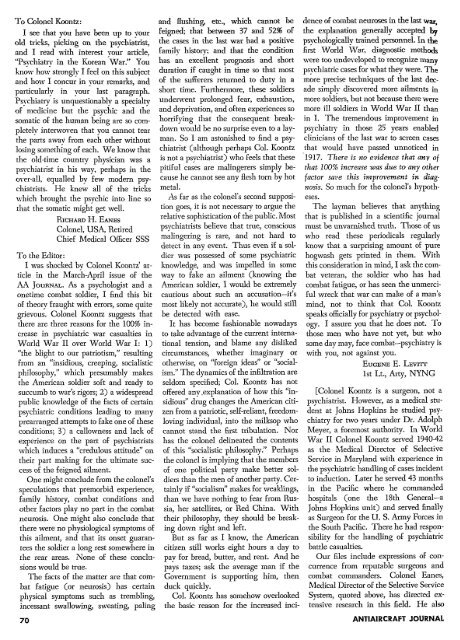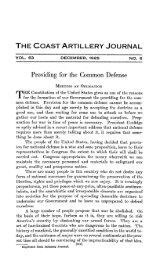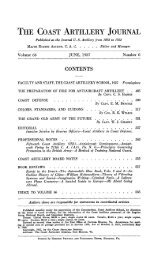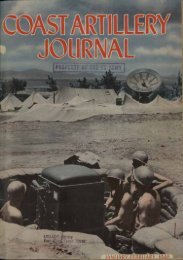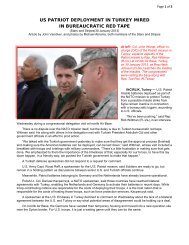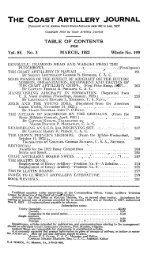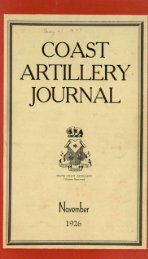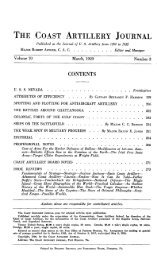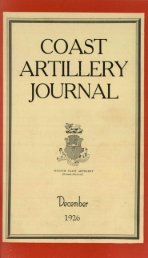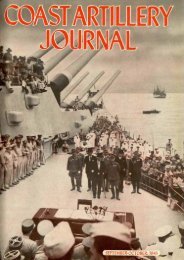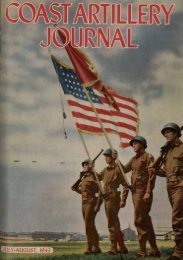July-August - Air Defense Artillery
July-August - Air Defense Artillery
July-August - Air Defense Artillery
Create successful ePaper yourself
Turn your PDF publications into a flip-book with our unique Google optimized e-Paper software.
To Colonel Koontz:<br />
I see that you have been up to your<br />
old tricks, picking on the psychiatrist,<br />
and I read with interest your article,<br />
"Psychiatry in the Korean War." You<br />
know how strongly I feel on this subject<br />
and how I concur in your remarks, and<br />
particularly in your last paragraph.<br />
Psychiatry is unquestionably a specialty<br />
of medicine but the psychic and the<br />
somatic of the human being are so completely<br />
interwoven that you cannot tear<br />
the parts away from each other without<br />
losing something of each. We know that<br />
the old-time country physician was a<br />
psychiatrist in his way, perhaps in the<br />
over-aU, equalled by few modem psychiatrists.<br />
He knew all of the tricks<br />
'which brought the psychic into line so<br />
that the somatic might get well.<br />
RICHARD H. EANES<br />
Colonel, USA, Retired<br />
Chief Medical Officer SSS<br />
To the Editor:<br />
I was shocked by Colonel Koontz' article<br />
in the March-April issue of the<br />
AA JOURNAL. As a psychologist and a<br />
onetime combat soldier, I find this bit<br />
of theory fraught with errors, some quite<br />
grievous. Colonel Koontz suggests that<br />
there are three reasons for the 100% increase<br />
in psychiatric war casualties in<br />
World War II over World War I: 1)<br />
"the blight to our patriotism," resulting<br />
from an "insidious, creeping, socialistic<br />
philosophy," which presumably makes<br />
the American soldier soft and ready to<br />
succumb to war's rigors; 2) a widespread<br />
public knowledge of the facts of certain<br />
psychiatric conditions leading to many<br />
prearranged attempts to fake one of these<br />
conditions; 3) a callowness and lack of<br />
experience on the part of psychiatrists<br />
which induces a "credulous attitude" on<br />
their part making for the ultimate success<br />
of the feigned ailment.<br />
One might conclude from the colonel's<br />
speculations that premorbid experience,<br />
family history, combat conditions and<br />
other factors play no part in the combat<br />
neurosis. One might also conclude that<br />
there were no physiological symptoms of<br />
this ailment, and that its onset guarantees<br />
the soldier a long rest somewhere in<br />
the rear areas. None of these conclusions<br />
v\.'Ouldbe true.<br />
The facts of the matter are that combat<br />
fatigue (or neurosis) has certain<br />
physical symptoms such as trembling,<br />
incessant swallowing, sweating, paling<br />
70<br />
and Hushing, etc., which cannot be<br />
feigned; that between 37 and 52% of<br />
the cases in the last war had a positive<br />
family history; and that the condition<br />
has an excellent prognosis and short<br />
duration if caught in time so that most<br />
of the sufferers returned to duty in a<br />
short time. Furthermore, these soldiers<br />
underwent prolonged fear, exhaustion,<br />
and deprivation, and often experiences so<br />
horrifying that the consequent breakdown<br />
would be no surprise even to a layman.<br />
So I am astonished to find a psychiatrist<br />
(although perhaps Col. Koontz<br />
is not a psychiatrist) who feels that these<br />
pitiful cases are malingerers simply because<br />
he cannot see any Hesh tom by hot<br />
metal.<br />
As far as the colonel's second supposition<br />
goes, it is not necessary to argue the<br />
relative sophistication of the public. Most<br />
psychiatrists believe that true, conscious<br />
malingering is rare, and not hard to<br />
detect in any event. Thus even if a soldier<br />
was possessed of some psychiatric<br />
knowledge, and was impelled in some<br />
way to fake an ailment (knowing the<br />
American soldier, I would be extremely<br />
cautious about such an accusation-it's<br />
most likely not accurate), he would still<br />
be detected with ease.<br />
It has become fashionable nowadays<br />
to take advantage of the current international<br />
tension, and blame any disliked<br />
circumstances, whether imaginary or<br />
othervvise, on "foreign ideas" or "socialism."<br />
The dynamics of the infiltration are<br />
seldom specified; Col. Koontz has not<br />
offered any.explanation of how this "insidious"<br />
drug changes the American citizen<br />
from a patriotic, self-reliant, freedomloving<br />
individual, into the milksop who<br />
cannot stand the first tribulation. Nor<br />
has the colonel delineated the contents<br />
of this "socialistic philosophy." Perhaps<br />
the colonel is implying that the members<br />
of one political party make better soldiers<br />
than the men of another party. Certainly<br />
if "socialism" makes for weaklings,<br />
than we have nothing to fear from Russia,<br />
her satellites, or Red China. With<br />
their philosophy, they should be breaking<br />
down right and left.<br />
But as far as I know, the American<br />
citizen still works eight hours a day to<br />
pay for bread, butter, and rent. And he<br />
pays taxes; ask the average man if the<br />
Government is supporting him, then<br />
duck quickly.<br />
Col. Koontz has somehow overlooked<br />
the basic reason for the increased inci-<br />
dence of combat neuroses in the last war,<br />
the explanation generally accepted by<br />
psychologically trained personnel. In the<br />
first \Vorld \Var, diagnostic methods<br />
were too undewloped to recognize many<br />
psychiatric cases for what they were. The<br />
more precise techniques of the last decade<br />
simply discO\'ered more ailments in<br />
more soldiers, but not because there were<br />
more ill soldiers in World War II than<br />
in 1. The tremendous improvement in<br />
psychiatry in those 25 years enabled<br />
clinicians of the last war to screen cases<br />
that would have passed unnoticed in<br />
'1917. There is no evidence that any of<br />
that 100% increase was due to any other<br />
factor save this improvement in diagnosis.<br />
So much for the colonel's hypotheses.<br />
The layman believes that anything<br />
that is published in a scientific journal<br />
must be unvarnished truth. Those of us<br />
who read these periodicals regularly<br />
know that a surprising amount of pure<br />
hogwash gets printed in them. With<br />
this consideration in mind, I ask the combat<br />
veteran, the soldier who has had<br />
combat fatigue, or has seen the unmerciful<br />
wreck that war can make of a man's<br />
mind, not to think that Col. Koontz<br />
speaks officially for psychiatry or psychology.<br />
I assure you that he does not. To<br />
those men who have not yet, but who<br />
some day may, face combat-psychiatry is<br />
with you, not against you.<br />
EUGENE E. LEVITT<br />
1st Lt., Arty, NYNG<br />
[Colonel Koontz is a surgeon, not a<br />
psychiatrist. However, as a medical student<br />
at Johns Hopkins he studied psychiatry<br />
for two years under Dr. Adolph<br />
Meyer, a foremost authority. In World<br />
War II Colonel Koontz served 1940-42<br />
as the Medical Director of Selective<br />
Service in Maryland with experience in<br />
the psychiatric handling of cases incident<br />
to induction. Later he served 43 months<br />
in the Pacific where he commanded<br />
hospitals (one the 18th General-a<br />
Johns Hopkins unit) and served finally<br />
as Surgeon for the U. S. Army Forces in<br />
the South Pacific. There he had responsibility<br />
for the handling of psychiatric<br />
battle casualties.<br />
Our files include expressions of concurrence<br />
from reputable surgeons and<br />
combat commanders. Colonel Eanes,<br />
Medical Director of the Selective Service<br />
System, quoted above, has directed extensive<br />
research in this field. He also<br />
ANTIAIRCRAFT JOURNAL


